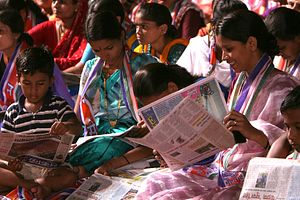How will the emergence of new democratic powers outside the West impact and shape the international liberal order? This question was touched upon in a discussion by Ted Piccone at an event hosted in Washington, D.C., by the group Young Professionals in International Affairs (YPIA).
Piccone addressed the question of the future of the liberal democratic order through his latest book, Five Rising Democracies and The Fate of The International Liberal Order, which focused on Brazil, India, Turkey, South Africa, and Indonesia. A senior fellow at the Brookings Institution, Piccone previously served eight years as a senior foreign policy advisor in the Clinton administration.
The future of liberal democracy is an interesting question at the moment because of the amount of backsliding currently going on both in the West and the rest of the world. “Established democracies are falling victim to apathy, polarization, and rising nationalism,” noted Piccone.
These types of phenomenon in democracies are mostly found in the West, which in turn decreases the appeal and pressure of democracy in the rest of the world, making countries like Turkey more prone to backsliding. However, some types of illiberal democracies are more likely than outright autocracies in the cases of backsliding.
According to Piccone, the world is no doubt growing richer and more prosperous because of better governance and globalization, and this is strongly linked in the minds of many people in the less developed world with political and economic liberalization (the latter is especially true in India, for example, which was politically liberalized for most of its independent history). However, the spread of democracy in the less developed world may not necessarily shore up the liberal world order, which is currently under pressure from China, Russia, and other countries.
Piccone sees three types of countries in the world: the established democracies (“the West”), the rising authoritarian powers, and the rising democracies. The rising democracies hold the balance of power in determining the future of the world order; the Western democracies by themselves no longer have the power, demographics, and economic clout to unilaterally sustain the world order created after the Second World War.
While Piccone believes that there is a clear trend toward democratization in the less developed world, this does not translate necessarily into support for the liberal world order in many countries, which means supporting democracy and human rights throughout the world. There are several reasons for this: suspicions dating back from the colonial era, the desire for strategic autonomy (as in India), and the failure of R2P (right to protect) in Libya. Furthermore, many countries feel as though the West singles out certain regions, such as Africa. For example, South Africa recently withdrew from the International Criminal Court (ICC) because it felt that the court only went after African leaders.
Nonetheless, Piccone believes that newly emerging liberalizing powers will support the international liberal order because democracy itself allows groups within democracies to influence governments. For example, he cites the influence Tamil parties in India have had on its policy toward Sri Lanka.
Moving forward, Piccone believes that in order for the West to get new democracies to contribute to the international order, they need to practice what they preach regarding human rights. They need to understand that newly emerging democracies have national interests as well, and these cannot be ignored. Finally, the West needs to expand the international table; for example, India, Brazil and other countries should become permanent members of the United Nations Security Council (UNSC). Many in the West are hesitant that these countries might not always vote with the West and may sometimes vote with China and Russia, but Piccone believes this is a risk worth taking to further bind these countries to the international liberal world.
There is no doubt that the future of the world order in the 21st century will be decided by the decisions taken by actors in the less developed world, especially in Asia. It would be interesting to see if trends toward greater democracy lead to the expansion and entrenchment of the international liberal order or not. There is no necessary correlation between a human rights-oriented foreign policy and a democratic system, but also no reason for these two things to not go together.

































